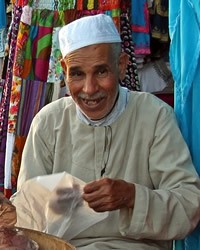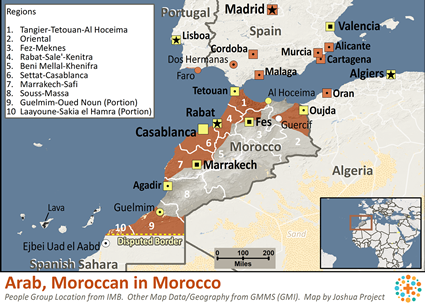The ancestors of the Moroccan Arabs originated in the Arabian Desert. From there, they gradually migrated into northern Africa. Over the centuries, the Arabs have become somewhat intermingled with the Berbers, and this has influenced their way of life. The two groups have remained distinct, but there is some overlap. Berber words have found their way into the Moroccan Arabic dialect, for example. Foods and customs blur between Moroccan Arabs and the more numerous Berber tribes.
Socially, there are two contrasting groups of Moroccan Arabs: those living in the cities and those in the rural areas. There are several classes among rural Arabs. At the top there are nobles who claim they are descendants of Mohammed. There are large landowners and tenant farmers. Moroccan Arabs live mainly in the north and west portions of Morocco. However, they prefer living in the more fertile regions near the Mediterranean Sea.
Most Moroccan Arabs are small time farmers. Because the Arabs are fond of grains, they produce and consume large amounts of barley, wheat and other cereals. In areas where water is plentiful, they grow other staples such as tomatoes, potatoes, beans, and peas. They also grow grapes, olives, oranges, peaches and pears.
Most rural Moroccans raise chickens, goats and sheep for their meat supply. This supplemental food source provides milk, eggs, butter, and meat. Although they do very little hunting and fishing, they often trade with local Berber tribes.
Whether in towns or villages, the women and men have distinct jobs. In the villages, men work the fields, herd the animals, and provide protection, while the women do housework and care for the children. Village women have a few agricultural tasks as well: milking the cows, goats, and sheep, and making butter. In the cities, women never work outside their homes. Traditional roles exist but are being influenced by western culture.
Life for Moroccan Arabs centers on important ceremonies, such as birth, marriage, and death. A boy also celebrates his first haircut and circumcision. The most elaborate of all ceremonies is the wedding. To preserve their people, Moroccan Arabs only marry those inside their own group.
Virtually all Moroccan Arabs in this region are Sunni Muslim. They adhere to the Koran and observe the five basic "pillars" of Islam, which include affirming that there is no god but Allah, and Mohammed is his prophet; praying five times a day while facing Mecca; giving alms generously; fasting during Ramadan, the ninth month of the Muslim year; and trying to make at least one pilgrimage to Mecca.
Believing that Allah is “distant” they usually depend on the spirit world for their daily needs.
There are few opportunities for Moroccan Arabs to hear and respond to the lifesaving gospel.
Ask God to give Moroccan Arab believers boldness to share the love of Christ with their friends and families.
Pray that God will call forth teams of intercessors who will faithfully stand in the gap for Moroccan Arabs.
Ask the Lord to raise up strong local Christian fellowships that will lead to more Jesus based fellowships.
Pray for gospel recordings to find their way into Moroccan Arab homes and villages.
Scripture Prayers for the Arab, Moroccan in Morocco.
https://en.wikipedia.org/wiki/Moroccan_Arabic
https://www.morocco-guide.com/culture/moroccan-people/
https://en.wikipedia.org/wiki/History_of_Morocco
| Profile Source: Joshua Project |


























